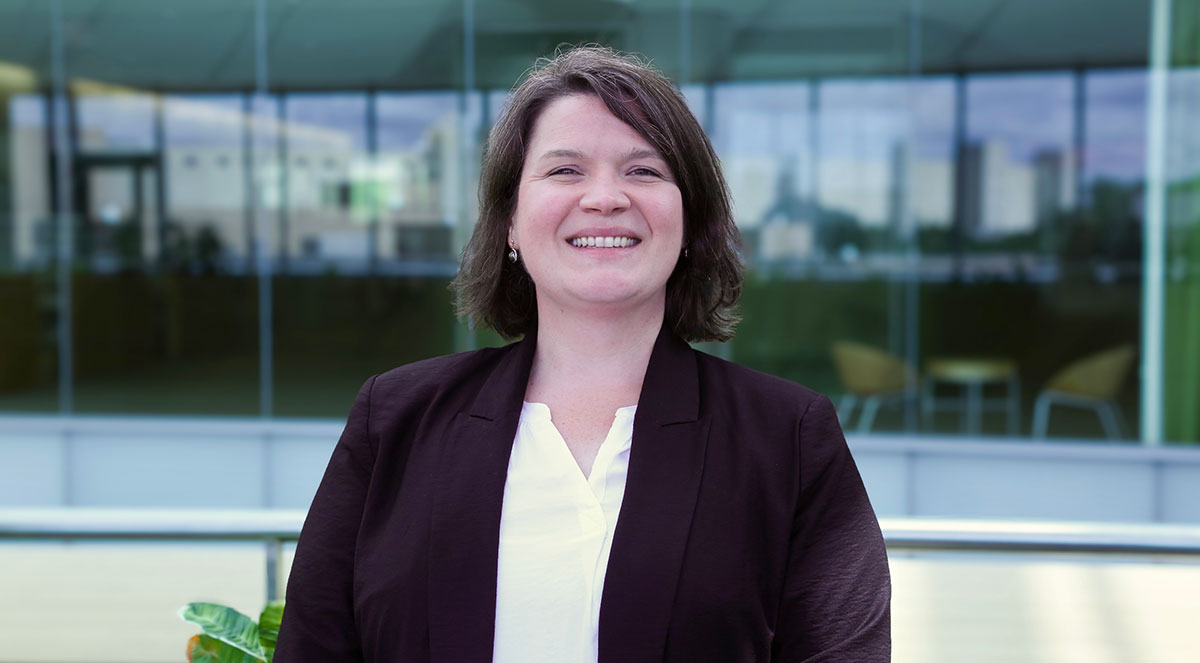Anywhere between 15 – 20 percent of all cancers are known to be caused by viruses. But with literally millions of different viruses living on or inside the human body, have we only scratched the surface of our understanding of how viruses impact human health?
New Morgridge Institute Investigator Megan Spurgeon would answer a resounding “yes” and provide a powerful case in point from her research lab. Spurgeon studies the newest identified human tumor virus, called Merkel cell polyomavirus (MCPyV or MCV), which was discovered only about 15 years ago and is implicated in a rare and deadly form of skin cancer.
Spurgeon’s research will fit right at home in Morgridge’s John W. and Jeanne M. Rowe Center for Research in Virology, which has a long track record of researching viruses with oncogenic potential, including human papillomavirus (HPV) and hepatitis B. Spurgeon joins Morgridge from the UW-Madison McArdle Laboratory for Cancer Research, where she was a senior scientist in viral oncology.
“As the power of sequencing and bioinformatics continues to evolve, I think that — similar to Merkel cell polyomavirus — we’re going to discover that viruses, whether they’re new, or we just haven’t discovered their oncogenic potential yet, contribute to other human cancers,” Spurgeon says.
MCPyV is a study in contrasts. Spurgeon says it’s a virus virtually every human gets during infancy, and at the time produces no known symptoms or side effects. Yet it’s the driver for Merkel cell carcinoma, which impacts about 3,000 Americans annually and is five times more deadly than melanoma. (It recently gained greater public awareness as the cause of death of musician Jimmy Buffett in 2023.)
Spurgeon also studies HPV, which is the leading cause of cervical cancer, and both viruses share some important similarities. Both are in the family of small DNA tumor viruses and both have a double-stranded DNA genome. And they both integrate their DNA into human cells, a precursor to developing into cancer.
One of Spurgeon’s major successes at McArdle was the development in 2019 of a model of papillomavirus sexual transmission using mice. HPV is very species-specific and scientists had few good options to study it in vivo until the recent discovery of a mouse papillomavirus. HPV is the most common sexually transmitted infection in the United States, making Spurgeon’s model an important tool for studying the dynamics of transmission in males and females.
Creating robust preclinical models will be critical to understanding the larger questions of how these viruses cause cancer, Spurgeon says. While Merkel cell carcinoma is rare, HPV is the leading cause of cervical cancer and contributes to other anogenital cancers and cancers of the head and neck. Despite effective vaccines that have reduced cervical cancer in developed countries, it’s still a major public health burden in parts of the United States and particularly in lower-income nations.
“From a basic research standpoint, learning how viruses cause cancer will always be important,” she says. “And the fact that MCPyV is the first polyomavirus discovered to cause cancer, I think, opens the door for us discovering new ways that tumor viruses can cause cancer that maybe other tumor viruses don’t.”
Asks Spurgeon: “What are the pathways that are involved? What are the master regulators? Are there genetic components in the host that predispose people to these cancers? I think that in studying this new tumor virus, we can discover a great deal about cancer biology as well as host biology.”
“Since getting the position here, I’ve thought a lot about what fearless science means to me. And it’s really about challenging scientific dogma, which I think can be one of the biggest impediments to scientific progress.”
Megan Spurgeon
Joining Morgridge offers the opportunity to elevate her research in collaboration with colleagues who are doing innovative virology work in biomedical imaging and bioinformatics, she says. That includes investigators Juan Caicedo, who is developing new imaging tools to explore cell morphology; and Anthony Gitter, who is using artificial intelligence techniques in biology.
“The Rowe Center identified tumor virology as the pivotal area for our latest investigator search because of its dramatic human and scientific impacts,” says Morgridge Investigator and Rowe Center Director Paul Ahlquist. “In that already high-value context, we’re particularly delighted to have recruited Megan, who, in just the last few years, has produced multiple major advances with small DNA tumor viruses. She’s a fabulous addition to our team, and we look forward to more breakthroughs already starting to emerge from her program.”
“Since getting the position here, I’ve thought a lot about what fearless science means to me,” Spurgeon says. “And it’s really about challenging scientific dogma, which I think can be one of the biggest impediments to scientific progress. I’m excited about having the support and encouragement to challenge some of those dogmas in the pursuit of advancements in virology and cancer research.”
Spurgeon also looks forward to participating in Morgridge’s public engagement mission to help ignite scientific curiosity in young students. She is from a small town in the Missouri Ozarks and her schools had limited resources. One of her first scientific memories was in middle school, when the teacher placed water from a local pond on a microscope slide to search the water for life. After nothing at first, she soon saw microscopic worms wriggling through the field of view.
“And I was just completely fascinated that something exists that you couldn’t see with the naked eye,” she says. “From there, it was off to the races for me and my career in science.”
